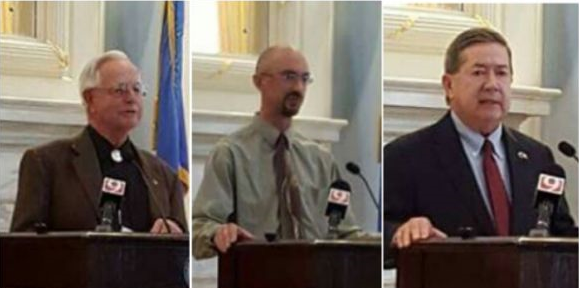Concerns raised over State Question 777 – Oklahoma Right to Farm or is it the Right to Harm?
Concerns raised over State Question 777
Lindsey Temple / Red Dirt Report
Council Co-chair Paul Muegge, Adam Price with the Oklahoma Food Cooperative and Council Chairman Drew Edmondson.
Lindsey Temple | November 18, 2015
Category:
OKLAHOMA CITY – On Tuesday, former Oklahoma Attorney General Drew Edmondson gathered at the State Capital along with several other members of the Oklahoma Stewardship Council to announce their opposition for State Question 777, titled “The Right to Farm.”
The “Right to Farm” would be an amendment to the Oklahoma Constitution if passed. Written by State Rep. Scott Biggs (R – Chickasha), the amendment would grant the rights of citizens and lawful residents of Oklahoma to engage in farming and ranching practices, according to the amendment those rights will be “forever granted” within the state of Oklahoma. The amendment also prohibits the passing of any law which abridges the right of citizens and lawful residents of Oklahoma to employ agricultural technology and livestock production and ranching practices without a compelling state interest.
Representing a coalition of farmers and advocates for good stewardship of the land and animals, the council urges Oklahomans to vote no on SQ 777 when it reaches the ballot next November. Edmondson and the council acknowledge that at first glance “The Right to Farm” seems beneficial to the small family farmer and the long standing heritage of agriculture in the state of Oklahoma but according to the council it is quite the opposite.
The council fears that by passing the amendment we will be threatening Oklahoma’s farmers by giving major advantages to the industrial factory farms, foreign corporations and animal cruelty operations like puppy mills and cock fighting.
“This measure would not only take away the power of the legislature and municipal governments to regulate agricultural practices, it effectively takes away the power of the people to vote on such changes,” Edmondson said. “The world of industrial agriculture is changing with chemical additives to feed, growth hormones and genetic modifications. I can understand why they want to be free from scrutiny and regulation, but I cannot understand why we should let them.”
The council also raises concerns about removing Oklahoma’s voice from setting agriculture standards for itself and leaves all decision-making to the federal government.
“The term ‘compelling state interest’ concerns me, if we were to allow this question to pass, under the Constitution of the State of Oklahoma any bill, initiative petition or city ordinance will be presumed unconstitutional and it would then be up to the legislature, people or municipality to prove they have a compelling state interest, that is an almost impossible burden,” added Edmondson.
Oklahoma Food Cooperative representative Adam Price was among those that voiced opposition to SQ777 and questioned who the amendment was actually meant to benefit. Price fears what passing the question will do to the rising farm to table movement and the growing demand for locally sourced food within Oklahoma.
“I’m actually terrified for what it means for our farmers markets and the small family farmers I work with,” Price said. “Our famers already have the right to farm, they don’t need to run from regulation they have nothing to hide, they already produce foods that are healthy for the land, the animals and the consumers. This question directly benefits large corporations with a goal of just increasing their profits.”
Also on hand was Council Co-Chair Paul Muegge, former Oklahoma state senator and member of The Humane Society of the United States, Oklahoma Agriculture Council, and long time Oklahoma farmer.
“SQ 777 is bad news for Oklahoma farmers and their communities,” Muegge said. “We have witnessed the demise of family agriculture as a result of the industrial model of food production. We must support and maintain diverse food systems, for our economic well-being and for our personal health.”
The council fears that the “Right to Farm” is so poorly and broadly written that passing it will open new doors for puppy breeding mills and cock fighting outfits as both operations consider themselves to be farms and will most likely expect protection under the amendment.
William Tabbernee, executive director of the Oklahoma Conference of Churches was on hand and urges Oklahomans to keep in mind a responsibility we have, “as humans we are stewards of God’s creation. We must take that stewardship seriously by ensuring a safe and humane environment for all creation, especially the animals entrusted to us.”
According to Edmondson, the council will be working hard throughout the next year along with other opposition movements that will likely run parallel to The Stewardship Council, with other movements addressing specific issues. The council plans to continue to grow and educate Oklahomans on what this amendment could potentially mean.
“This question should have been named right to harm and been numbered 666,” added Edmondson.

I agree no to sq777. But can we address the hypocrisy: “William Tabbernee, executive director of the Oklahoma Conference of Churches was on hand and urges Oklahomans to keep in mind a responsibility we have, “as humans we are stewards of God’s creation. We must take that stewardship seriously by ensuring a safe and humane environment for all creation, especially the animals entrusted to us.” UNLESS IT’S THE OIL AND GAS INDUSTRY PUMPING WASTEWATER INTO OUR LANDS WITH UNKNOWN CHEMICALS AND CAUSING PRESSURE ON EXISTING FAULT LINES